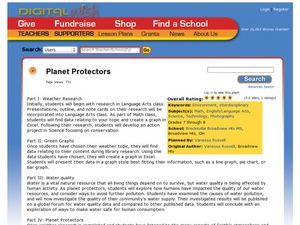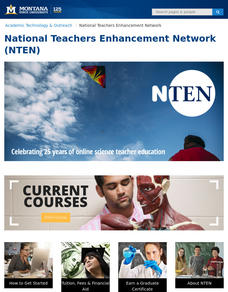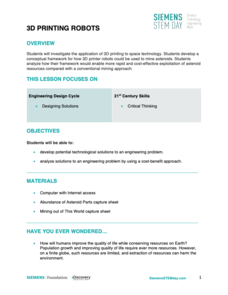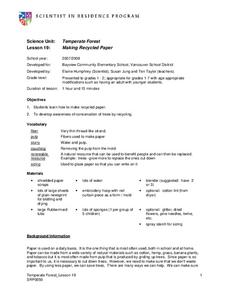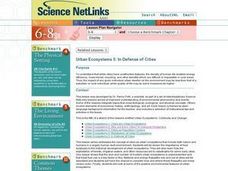Curated OER
Renewable vs. Non-Renewable Resources
Fifth graders, after brainstorming why conservation of resources is important, distinguish between renewable and non-renewable resources. They make a list of different types of natural resources on the board and then sort them into two...
Curated OER
Be a Watershed - Create a Living River
Students investigate water ways by conducting an experiment with classmates. In this natural resources lesson, students define a watershed and identify where large ones are located within the United States. Students utilize cups,...
Curated OER
CONTAMINANT SCAVENGER HUNT
Pupils identify substances and activities within a household that contribute to water pollution and identify safe cleaning alternatives for commercial cleaning products.
Curated OER
Rain, Rain, Go Away
Students conduct a number of experiments involving evaporation and condensation. They view and discuss a video about the water cycle and then design posters about the rain based on the book "Cloudy With A Chance of Meatballs".
Curated OER
Planet Protectors
Students explore ways to protect the earth. In this environmental issues and technology activity, students investigate the water quality in their community and compare their findings to the water quality in other geographic areas. ...
Curated OER
There's a Watershed in my Backyard!
Students explain what the term watershed is by creating a model. In this science, geography lesson, students demonstrate how the water moves in a watershed. Additionally, students learn about point source and nonpoint source pollution....
Curated OER
What Can You Do?
Learners explore reasons for the destruction of the wetlands and identify ways people can help protect them. They create and design a wetlands conservation poster to be presented to the class.
Curated OER
Species at Risk: Recovery Teams to the Rescue!
Sixth graders discuss how certain species and plants are deemed endangered. They work together in conservation recovery teams to research an endangered species. Then they explore efforts to make sure that the existence of these species...
Curated OER
WaterWeb
In this water worksheet, students answer 10 multiple-choice questions about the water cycle. Students also describe how they think their community is involved in sustaining water resources and write a pretend radio announcement about...
Curated OER
Losing Ground
Students examine the Dust Bowl and the effects of farming practices in the early 20th century. They read a handout, and conduct and discuss two experiments simulating soil erosion.
Curated OER
Hoot: Vocabulary: Magic Squares
Define words with numbers in a fun vocabulary activity. Using words from Hoot by Carl Hiaasen, learners use a grid to match words and their definitions, and to find the magic number that is the same when the numbers are added from all...
Carnegie Mellon University
How Power Plants Work 2
For this second of three lessons on power plants, future engineers find out how we generate electricity and how coal-powered plants operate. They work in small groups to make electromagnet generators to light LED bulbs. A set of...
Curated OER
Activity #5 Environmental Effects
Pupils explain the implications of particle theory of The Law of Conservation of Matter for problems of pollution and waste disposal. They describe, in terms of atoms and molecules, what happens to materials when they are dissolved or...
Curated OER
Water/Agua
Third graders complete water activities including vocabulary, visualization and performing activities. They study water vocabulary words in both English and Spanish. They listen to a read aloud of Jane Yolen's, Letting Swift River Go,...
Curated OER
Water Pollution Experiments
Fifth graders conduct experiments in simulated water pollution using a box of items to hold "pollutants"and an aquarium, representing a waterway. They observe how "rain" from a watering can poured into the box washes the pollutants into...
Curated OER
The Water Cycle
Students create an "animated" water cycle wheel that illustrates where water comes from and where it goes.
Discovery Education
3D Printing Robots
What is water worth to you? The answer probably depends on many different variables. Learners explore the value of water in space and what it takes to transport the resource to locations in a galaxy far far away. They then consider...
Curated OER
Combating Corrosion
Students perform an experiment to show the chemical reactions that occur when metal corrodes. They apply the results of the experiment to the conservation efforts of art curators trying to restore an ancient Greek bronze. This lesson...
Curated OER
Amazing Grazing: Keeping Our Ecosystem Running
Learners discover the value of sustainability within our ecosystem. In this ecological activity, students discuss the importance of a food cycle in our society, and how humans can improve the conservation of a healthy ecosystem....
Curated OER
Making Recycled Paper
Students explore paper making. In this tree conservation ecology lesson, students brainstorm ways paper is used in daily life. Students examine paper fiber using a magnifying glass. Students make paper following a step by step procedure...
California Academy of Science
Fish Prints
What do a dead fish, conservation, and paint have in common? The answer is a great lesson plan about fish anatomy, fun print making techniques, and unsustainable fishing practices. The class will start by making fish prints with a...
Kenan Fellows
Sustainability: Learning for a Lifetime – Soil
Do great gardeners really have green thumbs—or just really great soil? Environmental scholars discover what makes Earth's soil and soil quality so important through research and experimentation. Learners also develop an understanding of...
Curated OER
Urban Ecosystems 5: In Defense Of Cities
Students explain that while cities have unattractive features, the density of human life enables energy efficiency, mass transit, recycling, and other benefits which are difficult or impossible in rural areas. This is the fifth in an...
Earth Day Network
Staying Green While Being Clean
Clean up the environment with a lesson plan that focuses on replacing hazardous cleaning supplies with green, environmentally-friendly products. Using a dirty patch of surface as a control area, kids clean other parts of various surfaces...






